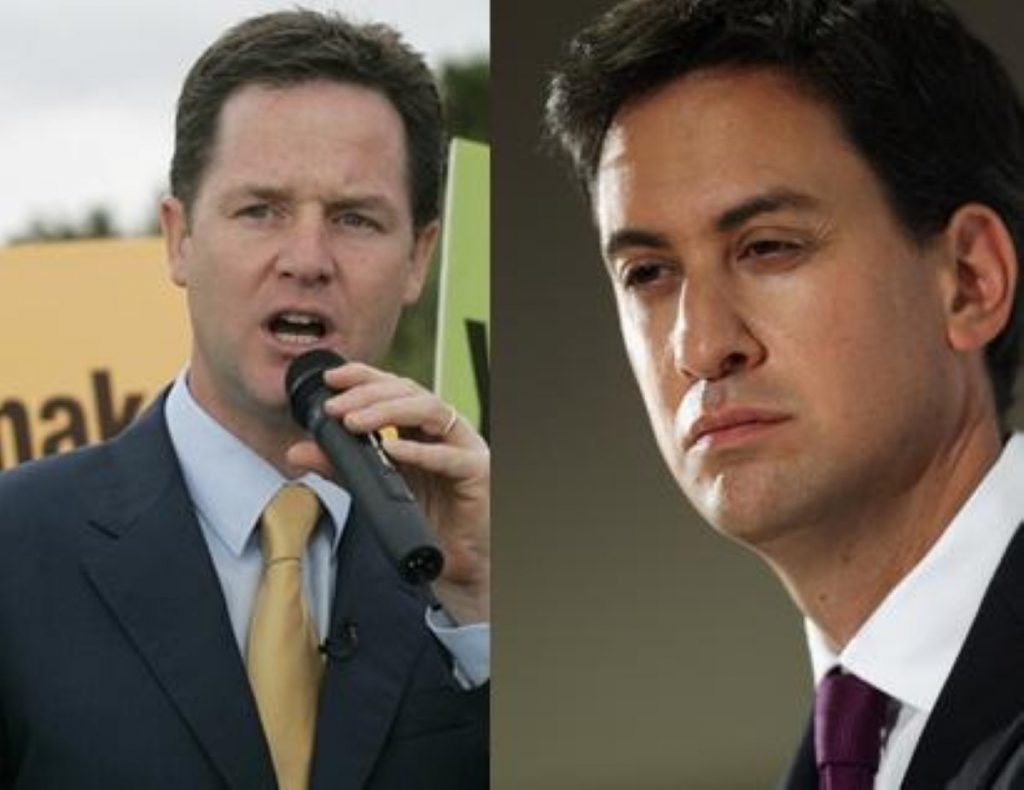Analysis: Miliband and Clegg fighting different battles
While Lib Dem knives are out against their coalition partners in this year's council elections scrap, Ed Miliband has his sights set on a bigger prize: No 10.
Labour's backroom strategists have called this one right. Instead of trying to win back control of a few measly local authorities by deploying their party leader in counties like Derbyshire and Nottinghamshire, the main party of opposition is targeting winnable marginals which could make the difference between victory and defeat in 2015.
"Suffolk has not traditionally been a Labour stronghold," Miliband declared at the start of his speech in Ipswich this morning. "But launching here is a sign that my party is dedicated to taking its message to every single part of our country."
The next few days will see Miliband heading to towns and cities where Labour has never controlled the local authority – but where the party believes it must make inroads if it is to win power outright in two years' time. The 'one nation' theme first unveiled in last year's barnstorming conference speech is demonstrating its flexibility by being used to underline the all-inclusive nature of Labour's approach. What his party offers, Miliband argued, is an "understanding that we have always succeeded as a nation and we will again when we unite not divide our country".


Internal divisions are what the coalition is all about – especially when you look at the bigger picture of these local elections. The vast bulk of the 2,500-odd seats being contested are pitching the Liberal Democrats against the Tories. Many of the councils being defended by Cameron's party this year were won by the Conservatives at their high-water mark in opposition, in 2009. Places like Somerset are now expected to fall back into Lib Dem hands. Clegg, having survived Eastleigh, is now moving on to the offensive.
What his party offers are "the right priorities in tough times", the deputy prime minister said at the Eden Project in Cornwall this morning. He showed the way to his grassroots by openly mocking some of the more dubious spending decisions by local Tories. "In the Cotswolds, after announcing nearly one and a half million pounds worth of cuts, how did the Conservative council try to boost staff morale?" Clegg sneered. "They hired a motivational magician – costing £19,000." This is not exactly highbrow stuff, but it will work wonders on the doorstep.
It also has the unwanted side-effect of making the Miliband approach look even more statesmanlike. He is taking the opportunity of actually coming up with some policies, proposing to give councils the power to veto new shops on the high street. "Currently if a bank branch closes down, a payday loan shop can move in and open up in the same place," he explained. "Even if there's already a payday lender just down the street. And there's nothing the local council can do. That can't be right." The Labour reflex – 'let's do something about it!' – returns front and centre, with a proposal allowing people to say 'no' to new shops whenever they feel like it. Whether or not it is a good idea or not, it is an actual idea. Which, for Labour, is a big deal.
When presented alongside the opposition's another national policies – restoring the 50% top rate of tax, introducing a £2 million mansion tax – Miliband is presenting himself as a man with a grand vision of society, barely bothered with the nitty-gritty of the actual contests on the ground in 2013. That he can afford to because Labour are barely present in the seats being contested this time around is neither here nor there. Clegg needs success in 2013 in order to shore up his leadership for the next two years. Miliband only needs to win one election – and it isn't this one.

